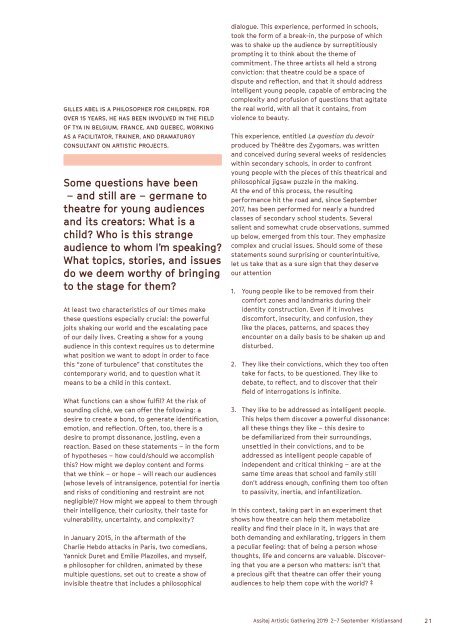ASSITEJ Magazine 2019
This is the annual ASSITEJ magazine, launched during the ASSITEJ Artistic Gathering 2019 in Kristiansand (Norway). It contains high-quality articles on theatre for young audiences from all corners of the world!
This is the annual ASSITEJ magazine, launched during the ASSITEJ Artistic Gathering 2019 in Kristiansand (Norway). It contains high-quality articles on theatre for young audiences from all corners of the world!
You also want an ePaper? Increase the reach of your titles
YUMPU automatically turns print PDFs into web optimized ePapers that Google loves.
GILLES ABEL IS A PHILOSOPHER FOR CHILDREN. FOR<br />
OVER 15 YEARS, HE HAS BEEN INVOLVED IN THE FIELD<br />
OF TYA IN BELGIUM, FRANCE, AND QUEBEC, WORKING<br />
AS A FACILITATOR, TRAINER, AND DRAMATURGY<br />
CONSULTANT ON ARTISTIC PROJECTS.<br />
Some questions have been<br />
– and still are – germane to<br />
theatre for young audiences<br />
and its creators: What is a<br />
child? Who is this strange<br />
audience to whom I’m speaking?<br />
What topics, stories, and issues<br />
do we deem worthy of bringing<br />
to the stage for them?<br />
At least two characteristics of our times make<br />
these questions especially crucial: the powerful<br />
jolts shaking our world and the escalating pace<br />
of our daily lives. Creating a show for a young<br />
audience in this context requires us to determine<br />
what position we want to adopt in order to face<br />
this “zone of turbulence” that constitutes the<br />
contemporary world, and to question what it<br />
means to be a child in this context.<br />
What functions can a show fulfil? At the risk of<br />
sounding cliché, we can offer the following: a<br />
desire to create a bond, to generate identification,<br />
emotion, and reflection. Often, too, there is a<br />
desire to prompt dissonance, jostling, even a<br />
reaction. Based on these statements – in the form<br />
of hypotheses – how could/should we accomplish<br />
this? How might we deploy content and forms<br />
that we think – or hope – will reach our audiences<br />
(whose levels of intransigence, potential for inertia<br />
and risks of conditioning and restraint are not<br />
negligible)? How might we appeal to them through<br />
their intelligence, their curiosity, their taste for<br />
vulnerability, uncertainty, and complexity?<br />
In January 2015, in the aftermath of the<br />
Charlie Hebdo attacks in Paris, two comedians,<br />
Yannick Duret and Emilie Plazolles, and myself,<br />
a philosopher for children, animated by these<br />
multiple questions, set out to create a show of<br />
invisible theatre that includes a philosophical<br />
dialogue. This experience, performed in schools,<br />
took the form of a break-in, the purpose of which<br />
was to shake up the audience by surreptitiously<br />
prompting it to think about the theme of<br />
commitment. The three artists all held a strong<br />
conviction: that theatre could be a space of<br />
dispute and reflection, and that it should address<br />
intelligent young people, capable of embracing the<br />
complexity and profusion of questions that agitate<br />
the real world, with all that it contains, from<br />
violence to beauty.<br />
This experience, entitled La question du devoir<br />
produced by Théâtre des Zygomars, was written<br />
and conceived during several weeks of residencies<br />
within secondary schools, in order to confront<br />
young people with the pieces of this theatrical and<br />
philosophical jigsaw puzzle in the making.<br />
At the end of this process, the resulting<br />
performance hit the road and, since September<br />
2017, has been performed for nearly a hundred<br />
classes of secondary school students. Several<br />
salient and somewhat crude observations, summed<br />
up below, emerged from this tour. They emphasize<br />
complex and crucial issues. Should some of these<br />
statements sound surprising or counterintuitive,<br />
let us take that as a sure sign that they deserve<br />
our attention<br />
1. Young people like to be removed from their<br />
comfort zones and landmarks during their<br />
identity construction. Even if it involves<br />
discomfort, insecurity, and confusion, they<br />
like the places, patterns, and spaces they<br />
encounter on a daily basis to be shaken up and<br />
disturbed.<br />
2. They like their convictions, which they too often<br />
take for facts, to be questioned. They like to<br />
debate, to reflect, and to discover that their<br />
field of interrogations is infinite.<br />
3. They like to be addressed as intelligent people.<br />
This helps them discover a powerful dissonance:<br />
all these things they like – this desire to<br />
be defamiliarized from their surroundings,<br />
unsettled in their convictions, and to be<br />
addressed as intelligent people capable of<br />
independent and critical thinking – are at the<br />
same time areas that school and family still<br />
don’t address enough, confining them too often<br />
to passivity, inertia, and infantilization.<br />
In this context, taking part in an experiment that<br />
shows how theatre can help them metabolize<br />
reality and find their place in it, in ways that are<br />
both demanding and exhilarating, triggers in them<br />
a peculiar feeling: that of being a person whose<br />
thoughts, life and concerns are valuable. Discovering<br />
that you are a person who matters: isn’t that<br />
a precious gift that theatre can offer their young<br />
audiences to help them cope with the world?<br />
Assitej Artistic Gathering <strong>2019</strong> 2–7 September Kristiansand<br />
21



